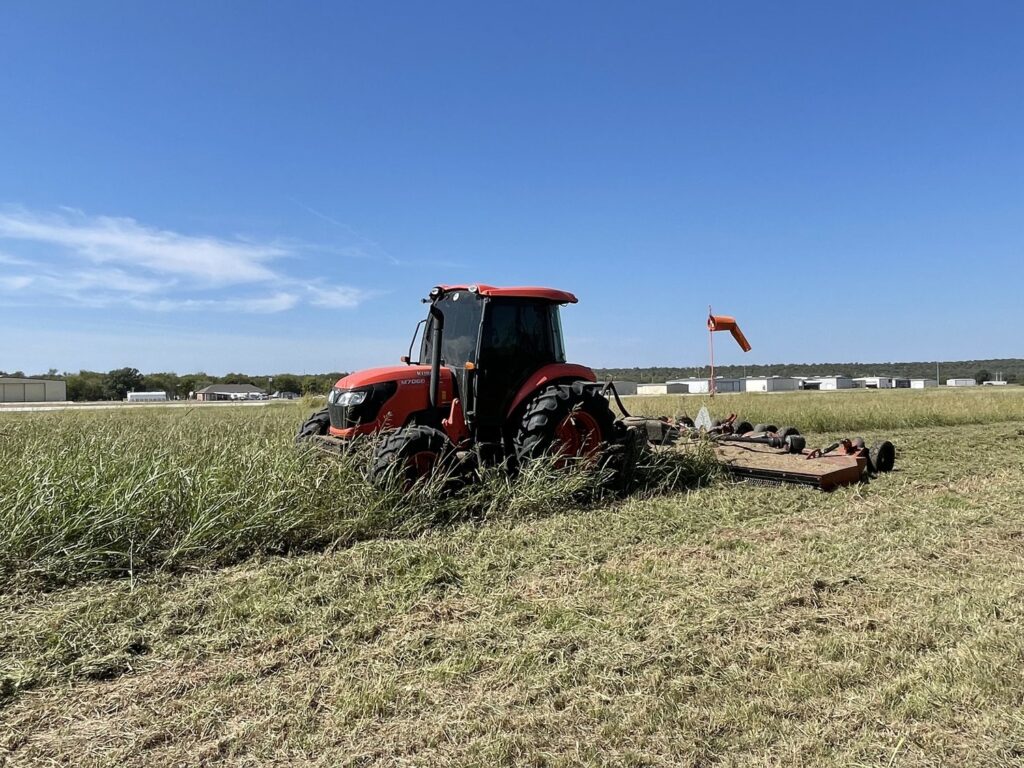
Content
Key Takeaways:
- Tractor mowing offers unmatched efficiency for large areas compared to traditional mowers.
- Modern tractors utilize advanced technology, including GPS, for precise lawn care.
- Professional tractor mowing services can be cost-effective by saving time and reducing labor costs for homeowners.
- Services differ for residential and commercial properties, focusing on tailored approaches and efficiency, respectively.
- Seasonal mowing aligns with grass growth cycles for optimal lawn health.
- Specialty services like weed control, aeration, and soil testing enhance overall lawn vitality.
- Post-mowing maintenance practices, like proper watering and fertilization, are crucial for lawn health.
- When selecting a mowing service, consider the provider’s experience, equipment quality, and community reputation.
- Engage with service providers to clarify their practices and ensure alignment with your lawn care needs.
- Building a long-term relationship with your lawn care provider leads to more effective maintenance and potential cost savings.
Why Choose Tractor Mowing for Your Lawn?
Tractor mowing has rapidly gained recognition as a preferred method for maintaining not only residential lawns but also vast commercial properties. This growing popularity can be attributed to several intrinsic advantages that tractor mowing provides over traditional push mowers or riding lawnmowers.
The Efficiency of Large Scale Mowing
For expansive areas such as residential estates or expansive commercial properties, tractor mowing shines in its unparalleled efficiency. Traditional mowers, on the other hand, are a bit labor and time-intensive, especially in larger plots of land. A riding mower is even more efficient than a push mower, but it is still nowhere near the rate at which a tractor can cover ground.
Modern tractors come with wide cutting decks that can cut wider swaths of grass in a single stroke compared to the traditional movers, significantly saving the time factor in landscaping activities. They not only reduce labor hours but also improve scheduling and let the available resources be harnessed in other similar important lawn care activities.
Besides this, tractors can move on different types of ground, such as slopes and uneven surfaces, much more efficiently than smaller equipment. Their powerful engines and strong construction enable them to function under conditions where smaller mowers would fail, making them perfect for varied landscapes. In addition, tractor mowing services generally utilize experienced operators who may be able to improve the effectiveness of the operation based on their experience, allowing for optimal cutting patterns in order to maximize the outcomes in terms of time and aesthetics.
Precision Cuts: How Technology Enhances Lawn Care
Attention to detail is the need of the hour. Tractor mowing gives that precision which is needed for a job. Advanced mowing technology in modern tractors has GPS navigation. Thus, with the use of GPS-guided mowers, the operator can design precise mowing patterns and ensure uniformity in mowing. This way, there will be minimal chance of missed patches or overlapping areas. This technology will help not only in obtaining an ideal cut but also contribute to healthier grass growth because irregular cutting may stress the blades of grass, and patchy lawns can be a problem.
Furthermore, tractor mowers are also equipped with high power cutting systems that can be used for various grass types and lengths. Most of these cutting systems can be set to higher or lower cutting heights depending on the season or the type of lawn. This can be set by the operator depending on the lawn’s current condition to suit seasonal changes, weather conditions, and health of the lawn.
In addition, most of the tractors also use the mulching technology, which cuts grass clippings into fine pieces and distributes them evenly across the lawn. This process can help promote nutrient retention in the soil to avoid the use of chemicals in fertilizers and therefore a more sustainable lawn care approach. Therefore, from the integration of advanced technology with the professional operation, tractor mowing ensures that your lawn not only looks perfect but is also cared for the long-term health.
Cost-Effectiveness of Professional Services
While one may expect high costs for hiring a tractor mowing service, in truth, it reflects an expense-effective solution when factoring in the long-term effects. The initial cost seems a bit steep, but what is saved in time and labor can easily pay back for these initial costs. Residential clients can afford to have their lawns mowed by tractors without having to spend a lot of money on expensive equipment that requires a significant upfront investment and maintenance costs.
In addition, hiring a professional service saves on the cost of buying fuel, lubricants, and replacement parts for personal mowers. Professional services use their purchasing power to get high-quality equipment and other resources better than individuals can, which saves on maintenance and repair. Another significant factor is labor costs.
In most cases, when property owners hire experienced professionals to handle their lawn care, they have time to concentrate on other critical matters in their lives or businesses. The saved time will significantly add value because instead of using it for laboring, clients can enjoy their leisure time or run some profitable ventures. Consequently, the cost-effectiveness of hiring professional tractor mowing services goes beyond just direct saving and into improved quality of life and operational efficiency.
Understanding the Different Types of Tractor Mowing Services
Not all lawns are created equal, and neither are the services employed to care for them. Tractor mowing operations can vary widely depending on the type of property involved and the specific needs of the clientele.
Residential vs. Commercial Mowing: What’s the Difference?
At the heart of mowing service offerings lies a distinction between residential and commercial mowing. Residential mowing focuses on smaller, more intricate lawn spaces typical of private homes, often requiring a tailored approach to maintain aesthetic appeal. A professional service dedicated to residential properties understands the nuances of different grass types and can suggest optimal maintenance practices that align with the homeowner’s lifestyle and their lawn’s specific needs.
On the other hand, commercial mowing services target larger properties and often emphasize efficiency and speed. Whether the property involves corporate landscapes, golf courses, or parks, commercial mowing services are expected to maintain vast green expanses that necessitate quick execution. Operators familiarize themselves with specific industry standards, ensuring that properties are kept pristine while complying with relevant lawn care regulations.
Moreover, commercial services often adopt systematic approaches to lawn care, including scheduled maintenance and strategic planning for seasonal growth patterns. Understanding the unique requirements of both residential and commercial segments allows service providers to customize their offerings, ensuring that both types of clients experience optimal results tailored to their specific environments.
Seasonal Mowing: Timing Your Service for Optimal Growth
Another critical component of effective lawn care is aligning mowing services with the needs presented by different seasons. Seasonal mowing acknowledges the varied growth cycles of grasses and the implications this has for maintenance practices. In spring, most grasses experience rapid resurrection, requiring more frequent mowing to keep them at ideal heights.
During this period, professional services ensure that the ground isn’t consistently cut too short, which can stress the plants. In the summer months, as grass growth slows, tractors can focus on maintaining uniformity without aggressive cutting. This approach allows lawns to conserve moisture and energy, essential for thriving health during potentially hot and dry conditions.
Conversely, fall is often characterized by an increase in leaf litter; thus, lawn care providers often employ mulching mowers to break down leaves while mowing, significantly reducing debris accumulation. Winter typically warrants a pause in the mowing cycle as turf remains dormant. However, in some regions, lawn cleanup services that include debris removal, aeration, and preparation for the spring mowing season become crucial. This seasonal adaptability not only enhances lawn health but also reflects the service provider’s commitment to comprehensive care that respects the unique demands of each season.
Specialty Services: Beyond Just Cutting Grass
While many associate mowing solely with grass upkeep, professional tractor services often extend their offerings into specialty areas that further support lawn health. For instance, weed control is a frequent adjunct service provided after a mowing session. Service providers often conduct assessments to identify weed prevalence and recommend appropriate herbicides or even organic solutions that align with client preferences and eco-friendly values. Aeration is another critical service that enhances lawn vitality. By using a tractor to create holes in the soil, aeration allows air, water, and nutrients to penetrate deeper, promoting more robust root development.
Oftentimes, many service providers will combine aeration with overseeding, where new grasses are introduced to existing lawns, which is particularly effective for revitalizing worn or sparse areas. Furthermore, soil testing is increasingly a sought-after service. This analysis helps in understanding the nutrient needs of the lawn, empowering clients to make informed decisions regarding fertilizer application and care strategies that bolster long-term health and aesthetic appeal. Together, these specialty services amplify overall lawn care effectiveness, ensuring properties display the utmost vibrancy and health.
Maintaining Your Lawn After Professional Mowing
Even after expert tractor mowing services have fulfilled their role, ongoing maintenance becomes vital. Property owners play an important part in ensuring that the benefits of professional mowing endure.
Best Practices for Post-Mowing Lawn Care
After the professionals have left your property, there are several best practices homeowners can implement to maintain their lawn’s health and aesthetics. First and foremost, allow freshly cut grass to remain briefly on the lawn. Grass clippings can act as natural fertilizers when mulched properly, returning nutrients to the soil. However, it is essential not to let clippings layer too thickly, as this can smother the grass underneath. Raking clippings occasionally can prevent this issue while distributing nutrients evenly. Watering becomes paramount post-mowing. It’s advisable to water your lawn early in the morning or late afternoon to reduce evaporation, allowing the grass blades to absorb moisture effectively. Keeping a moisture meter handy can assist in determining the best times for watering and ensuring your lawn receives adequate hydration without overwatering.
Fertilization, although often a product of spring tasks, remains essential throughout the growing season. Using slow-release fertilizers can encourage steady growth without overwhelming the grass, reducing chances of burning. Homeowners should monitor their lawns for any sign of distress, as this can indicate nutrient deficiencies or imbalances, prompting the need for immediate corrective action.
Fertilization and Weed Control: Keeping Your Lawn Lush
Nutrition is at the heart of lawn care. Fertilization should coincide with the growth cycles of the grass and the specific nutritional profile indicated by soil tests. For example, in spring, lawns may benefit from a nitrogen-heavy fertilizer to promote lush, green growth. On the other hand, fall may call for a fertilizer that emphasizes potassium to bolster resilience for the coming winter months. Weed control remains a proactive requirement in any lawn care venture.
Regular inspection of your lawn can help catch burgeoning weeds early. Employing pre-emergent herbicides during early spring can prevent the growth of weed seeds, while post-emergent herbicides can target existing weeds effectively. However, homeowners should always consider eco-friendly options that may pose less risk to plants and wildlife. This ensures that while the grass flourishes, the ecosystem surrounding it remains balanced and healthy.
How to Manage Irrigation Following a Mow
Post-mowing irrigation depends significantly on the conditions of both the mower and the environment. If the ground remains soggy or especially damp after a service, homeowners should forgo immediate watering to prevent clumping and root deterioration. Conversely, if the lawn appears dry post-mow, a light watering is advised to relieve stress and foster healing. It’s essential to monitor local weather conditions and adjust irrigation accordingly. For regions experiencing regular rainfall, homeowners may find that their lawns receive adequate moisture without the need for additional irrigation.
Conversely, extremely hot conditions might require daily assessments to provide the appropriate level of hydration. Automated irrigation systems can also play a powerful role in maintaining validity proofs. Homeowners can set these systems to water according to specific schedules and conditions, ensuring their lawn remains hydrated while minimizing water waste.
Choosing the Right Tractor Mowing Service for You
With numerous tractor mowing services available, selecting the right one for your needs can be a daunting task. Understanding key factors and evaluating potential candidates can streamline the decision-making process.
Key Factors to Consider: Experience, Equipment, and Reviews
Start by investigating the experience of local providers. A company’s history often reflects its reliability and proficiency in delivering quality services. Established providers usually have a track record that can be vetted through testimonials and reviews from previous clients. Checking customer satisfaction scores on platforms such as Google Reviews or Angie’s List can offer insights into service quality, responsiveness, and overall satisfaction. Equally critical is the equipment used by the service provider. High-quality tractors and cutting technology contribute to the overall efficiency and effectiveness of the service.
Providers that continually invest in newer equipment are more likely to achieve precision cuts and maintain their operational capabilities over time. Lastly, assessing a provider’s reputation within your community can also be insightful. Engaging with neighbors or local landscaping forums can provide valuable information about the positive or negative experiences of others, helping you to make an informed choice when selecting a tractor mowing service.
Questions to Ask Before Hiring Lawn Care Professionals
Before making a final decision, it is vital to engage in dialog with potential service providers. Begin by inquiring about their approach to lawn maintenance. Understanding their practices can clarify how they will handle your specific lawn needs, ensuring they align with your expectations.
Ask about their credentials, including licensing and insurance. Professional services should carry liability coverage to protect both their team and the client’s property. Obtaining proof of these credentials can cushion against potential issues that may arise during service delivery. Inquire about their service frequency options, whether they offer seasonal plans, and if they are open to customizing a package based on your particular requirements.
Furthermore, transparency about costs, including any additional fees for specialty services, is essential to avoid surprises and help budgeting efforts. Lastly, discussing their approach to customer service can prove valuable. A responsive team with a solid customer service ethos will likely ensure that any concerns or requests are handled efficiently, keeping you informed at every step.
Building a Long-Term Relationship with Your Lawn Care Experts
Creating a sustained partnership with your lawn care provider can result in an abundance of positive outcomes. A long-term relationship allows your service provider to gain familiarity with your lawn’s specific needs over time, yielding more effective care and tailored services. By establishing clear lines of communication, clients can provide feedback and updates regarding changes in their property or preferences, fostering a collaborative approach to lawn maintenance. Service providers may also offer special discounts or perks for long-term clients, smoothing costs while enhancing service quality. Regularly scheduled visits can lead to cumulative benefits, wherein consistent care minimizes stress on the lawn, supporting healthier growth over time.
Moreover, loyal customers may benefit from priority scheduling during peak times, ensuring that their lawn retains its aesthetic appeal consistently. Engaging with your lawn care experts also opens pathways for additional services, as they become more in-tune with your property, identifying areas for improvement and recommending complementary services that can bolster overall lawn health. In summary, by investing in a reputable tractor mowing service and establishing an ongoing relationship, clients can maximize the vitality and beauty of their lawns, transforming their outdoor spaces into flourishing environments year-round.

With a sharp eye for design and a passion for renovation, Samantha transforms fixer-uppers into dream homes. Her expertise in remodeling adds extra value to your real estate experience.








